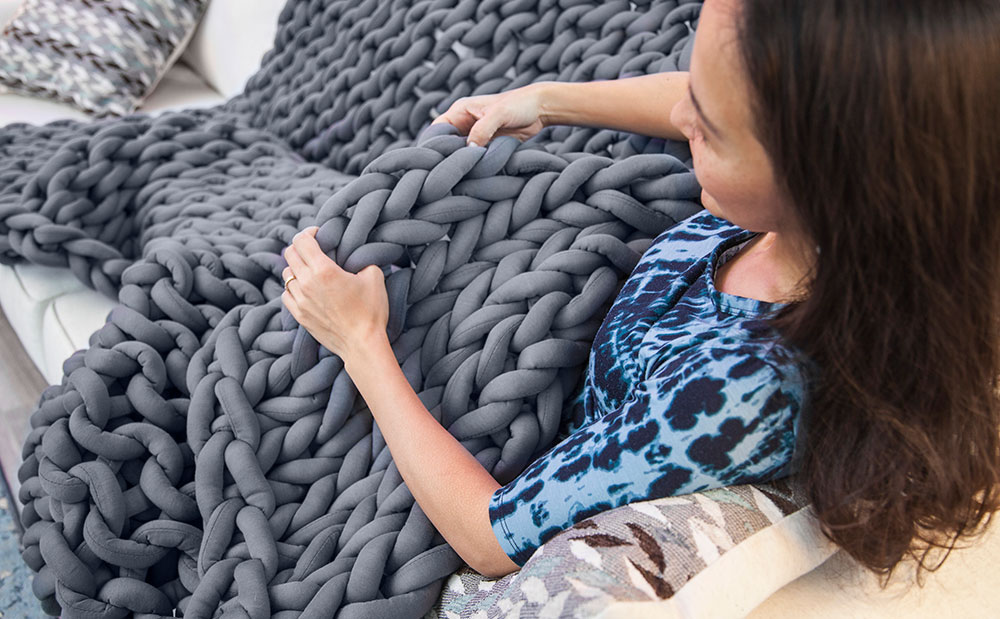
Legend has it that Keith Zivalich invented the first weighted blanket in 1997 when his young daughter placed a Beanie Baby on his shoulder. (1) The calming effect of the weight sparked a million-dollar idea for Zivalich, and a bedding industry superstar was born. Three decades later, weighted blankets have indeed become a multi-million dollar industry, and anyone who fancies sleeping with a weighted blanket can easily indulge in the calming effects of deep-pressure therapy from the comfort of their own bed. (2)
Note: The content on Sleepopolis is meant to be informative in nature, but it shouldn’t be taken as medical advice, and it shouldn’t take the place of medical advice and supervision from a trained professional. If you feel you may be suffering from any sleep disorder or medical condition, please see your healthcare provider immediately.
Long Story Short
- A weighted blanket is a heavier blanket that offers users a form of deep-pressure therapy to trigger a calming effect akin to a hug or a swaddle.
- Sleeping with a weighted blanket may be beneficial to those who have a hard time falling asleep due to anxiety.
- Weighted blankets are available in all sizes and weights. As a general rule, however, they should weigh 10 percent of your body weight.
What Is a Weighted Blanket?
Mark Aloia, head of sleep and behavioral sciences at Sleep Number and an associate professor of medicine at National Jewish Health in Denver, Colorado, tells Sleepopolis, “A weighted blanket is a heavier blanket that can be used to reduce stress and anxiety because of the extra weight it adds onto your body.”
Essentially, weighted blankets are a form of deep-pressure therapy. They can trigger a calming effect in those who use them, (6) similar to a hug, the sensation of touch, or a baby’s swaddle. (6) Weighted blankets are often filled with sand, plastic poly pellets, micro glass beads, or steel shot beads and typically weigh anywhere between five and 20 pounds. They’re also available in a wide range of materials, including cotton, bamboo, linen, flannel, and polyester.
Why Are Weighted Blankets Good for Sleep?
While plenty of anecdotal evidence supports weighted blankets for sleep, the research is confounding at best. There are studies that show weighted blankets improve sleep, others with ambiguous results, and new research that’s promising but still evolving.
While one study showed that weighted blankets had a positive impact on falling asleep and staying asleep, another showed weighted blankets were effective in relieving anxiety, but their benefit for reducing insomnia and improving sleep remained unclear. (3) (4)
Despite the occasionally counter-active nature of those studies, Aloia tells us some newer research demonstrates that weighted blankets may improve sleep through biological mechanisms. Specifically, he points to “a 2022 study that showed a 32 percent increase in melatonin in the first hour of restfulness using the right weighted blanket.” (5) Although the study was small (26 participants) and Aloia notes there were no differences in total sleep time or subjective sleepiness of the participants compared to those not using a weighted blanket, he says, “These findings are still impressive.”
Yet another study from 2020 showed that the deep pressure from weighted blankets may activate the parasympathetic nervous system (the system that controls your body’s ability to relax, commonly known as its “rest and digest” functions) and promote the release of oxytocin (aka the happy hormone), which may also play a role in the relaxation necessary for sleep. (6) Ultimately, this study concluded that weighted blankets may be an effective intervention for insomnia but only for a specific segment of the population — folks with certain mental disorders. (6)
The heft of a weighted blanket provides gentle pressure to the body, which in turn may activates the body’s parasympathetic nervous system. (6) So, when your heart rate rises due to stress, weighted blankets restore some calm and lower it by way of your parasympathetic nervous system.
The TLDR: Some of the existing research is a bit contradictory, but recent research does show some promise. That being said, what works for one may not work for another, but it may be worth a try depending on your needs.
Other Benefits of Weighted Blankets
In addition to their possibilities for improved sleep, weighted blankets may have broader applications across a host of conditions. Although the research is still quite limited, existing research shows weighted blankets may: (3) (7)
- Promote a sense of calm
- Ease feelings of stress and anxiety
- Improve daytime functioning
- Reduce chronic pain
- Improve the overall well-being of children and adults with ADHD or autism spectrum disorder.
How to Choose a Weighted Blanket
When looking for a weighted blanket, Aloia says there are a few important considerations to keep in mind:
Comfort, Materials, and Weight
First and foremost, Aloia suggests looking for a blanket that’s comfortable for you. This applies to materials, fill, and weight.
“Weighted blankets come in multiple weights, and it’s important to determine which works best for you,” says Aloia. “One that is too heavy may put pressure on your breathing or make it hard to move during the night.” Aloia adds, “The ideal weight for a weighted blanket is between 5 percent and 12 percent of the user’s bodyweight, but most people prefer the weight to be around 10 percent of their body weight based on comfort.”
Temperature Control
“Some materials retain heat more than others, so it’s best to look for something that is breathable and can move heat and humidity away from your body,” says Aloia. “You should think of the area immediately around your body and under a blanket as a micro-environment. Controlling this environment is very beneficial to promoting and maintaining a good night’s sleep.” Ultimately, he says, “It’s best to look for something with breathable materials (i.e., cotton or bamboo) and avoid those that retain heat, such as polyester and nylon. ”
Care Requirements
“If you know you’ll be using your weighted blanket frequently, it’s important to find one that is easy to clean,” says Aloia. “Look for blankets with removable covers that can be washed and dried on low heat in the washing machine and dryer.”
Trial Periods
Aloia also cautions that sleeping with a weighted blanket is not for everyone. “Everyone has different needs and preferences when it comes to sleep,” he says. “Some people may not like the heavier blanket feeling, while others may feel that it helps with their anxiety at night and promotes falling asleep.” If you’re not sure about your commitment to a weighted blanket, Aloia says, “It’s a good idea to test the blanket out in the comfort of your own home to make sure it’s the right choice for you and that you chose the right blanket and weight.” Weighted blankets that have a trial period or warranty included can help eliminate the annoyance and stress of returns.
Who Should Not Sleep with a Weighted Blanket
While weighted blankets may sound innocuous and widely applicable, Aloia says, “People with low blood pressure, respiratory disorders, diabetes or obstructive sleep apnea should speak with their doctor before purchasing a weighted blanket.” (8) He explains, “In some cases, the additional weight and pressure of the blanket can impact their sleep negatively, make breathing more difficult, or impact peripheral circulation.” When in doubt, it’s always best to consult with your healthcare provider before use.
We’ll add here that in May 2024, Consumer Reports recommended a halt to sales of weighted products for babies across all retailers, citing safety concerns. (9) While weighted wearable blankets were marketed for use with infants and even newborns, medical experts are sounding the alarm. They argue that while pressure is intended to be gentle, it can obstruct babies’ breathing and heart rates and pose a risk of suffocation as the weight makes it difficult for them to move out of an unsafe sleeping position. (8)
FAQs
Is it OK to sleep with a weighted blanket every night?
“There are generally no concerns with sleeping with a weighted blanket; it’s just a matter of personal preference,” says Aloia. “Those with health conditions like low blood pressure, respiratory disorders, diabetes or obstructive sleep apnea disorders should check with their doctor before purchasing a weighted blanket, but for those in generally good health, there are no issues with using a weighted blanket every night.”
Can you sleep on your side with a weighted blanket?
“Yes, it is fine to sleep on your side with a weighted blanket,” says Aloia. “Side sleepers may find that weighted blankets provide the comforting pressure that can mimic a hug, which may promote relaxation and improve sleep quality, assuming they do not have any issues with all the factors I’ve shared earlier (e.g., low blood pressure, respiratory disorders). Just remember to choose weighted blankets that are right for your body, and if you are in doubt, consult with your doctor before using one.”
Can a weighted blanket be too heavy?
The ideal weight for a weighted blanket is between 5 percent and 12 percent of the user’s body weight. However, blankets that weigh 10 percent of a sleeper’s body weight seem to be a happy medium for most people. Anything heavier may put pressure on your breathing or make it hard to move during the night.”
The Last Word From Sleepopolis
While more research is needed on the topic, preliminary studies show that sleeping with a weighted blanket may be beneficial to some people. At a minimum, weighted blankets can induce a calming effect by capitalizing on the science of deep-pressure therapy. That being said, what may work for some doesn’t always work for others. While weighted blankets might make a difference for you, it’s a good idea to manage expectations going into it.
Sources
- Magic Weighted Blanket Press. Magic Weighted Blanket. (n.d.). https://magicweightedblanket.com/pages/press
- Eron, K., Kohnert, L., Watters, A., Logan, C., Weisner-Rose, M., & Mehler, P. S. (2020, March 12). Weighted blanket use: A systematic review. American Occupational Therapy Association. https://research.aota.org/ajot/article-abstract/74/2/7402205010p1/6662/Weighted-Blanket-Use-A-Systematic-Review?redirectedFrom=fulltext
- Bolic Baric V, Skuthälla S, Pettersson M, Gustafsson PA, Kjellberg A. The effectiveness of weighted blankets on sleep and everyday activities – A retrospective follow-up study of children and adults with attention deficit hyperactivity disorder and/or autism spectrum disorder. Scand J Occup Ther. 2023;30(8):1357-1367. doi:10.1080/11038128.2021.1939414
- Eron K, Kohnert L, Watters A, Logan C, Weisner-Rose M, Mehler PS. Weighted Blanket Use: A Systematic Review. Am J Occup Ther. 2020;74(2):7402205010p1-7402205010p14. doi:10.5014/ajot.2020.037358
- S. Meth, E. M., Mateus Brandão, L. E., Xue, P., Grip, A., Wu, J., Adan, A., Andersson, F., Pacheco, A. P., Uvnäs-Moberg, K., Cedernaes, J., & Benedict, C. (2023). A weighted blanket increases pre-sleep salivary concentrations of melatonin in young, healthy adults. Journal of Sleep Research, 32(2), e13743. https://doi.org/10.1111/jsr.13743
- Ekholm B, Spulber S, Adler M. A randomized controlled study of weighted chain blankets for insomnia in psychiatric disorders. J Clin Sleep Med. 2020;16(9):1567-1577. doi:10.5664/jcsm.8636
- Baumgartner, J. N., Quintana, D., Leija, L., Schuster, N. M., Bruno, K. A., Castellanos, J. P., & Case, L. K. (2022). Widespread pressure delivered by a weighted blanket reduces chronic pain: A randomized controlled trial. The Journal of Pain, 23(1), 156–174. https://doi.org/10.1016/j.jpain.2021.07.009
- Yu, J., Yang, Z., Sun, S., Sun, K., Chen, W., Zhang, L., Xu, J., Xu, Q., Liu, Z., Ke, J., Zhang, L., & Zhu, Y. (2024, March 27). The effect of weighted blankets on sleep and related disorders: A brief review. Frontiers. https://www.frontiersin.org/journals/psychiatry/articles/10.3389/fpsyt.2024.1333015/full
- Kirchner, L. (n.d.). Amazon and Target will bar sales of weighted baby sleep sacks and weighted baby swaddles due to safety concerns. Consumer Reports. https://www.consumerreports.org/babies-kids/child-safety/retailers-to-bar-sales-of-weighted-baby-sleep-sacks-swaddles-a8296427468/
Aloia, Mark. Author Interview. May 13, 2024.



























